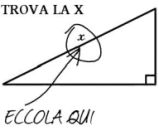Hello,
I have never written in this forum section, this is the first time that I try talk about math in English. I have some problems in English and I can't understand very well when someone speaks to me in English (and I do so many mistakes when I write, Correct me please!). What about talk complex numbers? That is a very interesting matematical proof for me, but I don't know nothing about complex numbers. Can you talk about the basis of complex numbers?
Thank you very much.
The Pitagorico
15 messaggi
• Vai alla pagina... • 1, 2
English in math, complex numbers
"I decimali non calcolati di π riposano in un misterioso regno astratto, dove fruiscono di una debole realtà. Fino a quando non saranno calcolati non si trasformeranno in qualcosa di pienamente reale, e persino allora la loro realtà sarà una mera questione di grado."
William James
William James
-

Il Pitagorico - Average Member

- Messaggio: 281 di 594
- Iscritto il: 03/04/2012, 21:53
- Località: Castello Barbaccia, nei pressi di Poggibonsi
Re: English in math, complex numbers
well done!
Non permettere mai a nessuno di dirti che non sai fare qualcosa.
Se hai un sogno tu lo devi proteggere.
Quando le persone non sanno fare qualcosa lo dicono a te che non la sai fare.
Se vuoi qualcosa, vai e inseguila. Punto.
Se hai un sogno tu lo devi proteggere.
Quando le persone non sanno fare qualcosa lo dicono a te che non la sai fare.
Se vuoi qualcosa, vai e inseguila. Punto.
-

Stellinelm - Senior Member

- Messaggio: 748 di 1750
- Iscritto il: 04/12/2011, 10:16
Re: English in math, complex numbers
Hello world, my english is awful, but I try to explaining something useful for you. 
Complex numbers may be defined in several ways, but I think the simplest definition is the seguent:
A complex number $z$ is a number of the form $z=x+iy$ in which
- $x,y\in \RR$ are the real and complex part of $z$
- $i$ is the imaginary unit, $i=\sqrt(-1)$.
So, there are many ways to explain why $i$ is $\sqrt(-1)$, but I think is better go on.
But we have, for example, $\sqrt(-25)= \sqrt(25\cdot (-1))= \sqrt(25)\cdot \sqrt(-1)= \pm 5i$.
A little notation hint:
- $x$ is the real part of $z$ and it can be indicated by the symbol $Re(z)$ (or $Rez$, but I don't like this form)$(1)$
- $y$ is the imaginary part of $z$ and it can be written as $Im(z)$.
We can note that complex numbers are an extension of the real ones, in fact a real number is a complex number without imaginary part (or with null imaginary part):
$25= 25+0i$
$\sqrt(2)= \sqrt(2)+0i$
and so on...
Now we can use complex number to give a sense to the roots of polynomials.
Example 1.
$x^2+1=0$
It doesn't have real solutions (or real roots).
$x^2=-1$ implies $x=\pm \sqrt(-1)$
and so
$x=\pm i$
This equation has two complex roots.
Example 2.
$x^2 + 2x+4=0$
It doesn't have real solutions (in high school we call it "falso quadrato" ), but
), but
$x_(1,2)= -1 \pm \sqrt{1-4}= -1 pm \sqrt(-3)=-1 \pm i \sqrt(3)$.
___
$(1)$ There is another way to indicate $Re(z)$ and $Im(z)$ but I don't know LaTeX code for them...
EDIT
Thanks to Meringolo for correction.
Have a nice weekend forumists.

Complex numbers may be defined in several ways, but I think the simplest definition is the seguent:
A complex number $z$ is a number of the form $z=x+iy$ in which
- $x,y\in \RR$ are the real and complex part of $z$
- $i$ is the imaginary unit, $i=\sqrt(-1)$.
So, there are many ways to explain why $i$ is $\sqrt(-1)$, but I think is better go on.

But we have, for example, $\sqrt(-25)= \sqrt(25\cdot (-1))= \sqrt(25)\cdot \sqrt(-1)= \pm 5i$.
A little notation hint:
- $x$ is the real part of $z$ and it can be indicated by the symbol $Re(z)$ (or $Rez$, but I don't like this form)$(1)$
- $y$ is the imaginary part of $z$ and it can be written as $Im(z)$.
We can note that complex numbers are an extension of the real ones, in fact a real number is a complex number without imaginary part (or with null imaginary part):
$25= 25+0i$
$\sqrt(2)= \sqrt(2)+0i$
and so on...
Now we can use complex number to give a sense to the roots of polynomials.
Example 1.
$x^2+1=0$
It doesn't have real solutions (or real roots).
$x^2=-1$ implies $x=\pm \sqrt(-1)$
and so
$x=\pm i$
This equation has two complex roots.
Example 2.
$x^2 + 2x+4=0$
It doesn't have real solutions (in high school we call it "falso quadrato"
 ), but
), but$x_(1,2)= -1 \pm \sqrt{1-4}= -1 pm \sqrt(-3)=-1 \pm i \sqrt(3)$.
___
$(1)$ There is another way to indicate $Re(z)$ and $Im(z)$ but I don't know LaTeX code for them...
EDIT
Thanks to Meringolo for correction.
Have a nice weekend forumists.

Ultima modifica di Zero87 il 20/04/2013, 10:36, modificato 1 volta in totale.
Ex studente Unicam 
-

Zero87 - Cannot live without

- Messaggio: 1900 di 12931
- Iscritto il: 12/01/2008, 23:05
- Località: Marche
Re: English in math, complex numbers
Zero87 ha scritto:It doesn't have real solutions (in high school we call him "falso quadrato"),
Well,I think it's more accurate to say "...we call it "falso quadrato"", cause we talking about an object.
But this is just find "the hair in the egg"
Stay hungry, stay foolish
-

Meringolo - Average Member

- Messaggio: 232 di 886
- Iscritto il: 25/10/2010, 18:41
- Località: Earth
Re: English in math, complex numbers
Let me first give you some grammatical advices:
$text()^1$ Fortunately that is correct, but pay attention, because that is an infinitive, namely a verb form that is used as a noun, so it's "I try talking/to talk/talk" (the last form is used the least actually, but it's still correct)
$text()^2$ Same thing here, talk is an infinitive so it is correct, but the sentence in this case is not: What about talk about complex numbers? This should be the correct form (otherwise it means "Che dite di parlare i numeri complessi" and that doesn't mean anything). As you can see it sounds bad because you need to repeat two times the word "about"... Just say Why don't we talk about complex numbers?
$text()^3$ I think you mean topic/subject/argument, since you haven't proved anything
$text()^4$ The double negative is almost never used in English, and in this case it's even wrong. Correct is I don't know anything or I know nothing.
___________________________________________________
Zero87 has already explained the basis, so I'll just add some details:
We started from natural numbers, like $1, 2, 3, 4, \ldots$. If we want the natural number system $NN$ to be extended to the integer number system $ZZ$, we need to create negative numbers. If we want to extend $ZZ$ we need to create rational numbers (like $3/5$) so we can create the set $QQ$, and to extend even more we must create irrational numbers, such as $sqrt(2)$, $log_2 12$,$\phi$, ecc. (algebraic, this set is actually indicated with symbol $\bar(QQ)$, if I am not wrong) and $pi$, $e$, ecc. (trascendental). This way we can represent any quantity on a continuous line, and we name the set that includes every quantity $RR$ (the set of the real numbers).
Now, if we want to expand this set we need to create imaginary numbers, we define them as numbers that can be written as real numbers multiplied by the imaginary unit $i$, which is defined as $i^2=-1$. This can create some problems, so we must also create the principal square root of a complex number. I won't go into details anyway, because this could be very confusing. However, now we can extend the set of real numbers $RR$: we define a complex number as the sum of a real number and an imaginary number ($a + bi$ where $a$ and $b$ are real numbers and $i$ is the imaginary unit).
If we usually represent a general natural number with the letter $n$, a real number with the letter $x$, or $a$, well, we usually represent a complex number with letter $z$.
Since we can already represent all real numbers on a continuous line, to represent a complex number we need two dimensions. So, we can say that a complex number can be viewed as a point or a position vector in a two-dimensional Cartesian coordinate system called complex plane, where horizontal axis is the real axis (indicated usually by "Re" or $RR$) and the vertical axis is the imaginary axis (indicated usually by "Im").
Hope that is clear enough.
Il Pitagorico ha scritto:Hello,
I have never written in this forum section, this is the first time that I try talk$text()^1$ about math in English. I have some problems in English and I can't understand very well when someone speaks to me in English (and I do so many mistakes when I write, Correct me please!). What about talk complex numbers?$text()^2$ That is a very interesting matematical proof$text()^3$ for me, but I don't know nothing$text()^4$ about complex numbers. Can you talk about the basis of complex numbers?
Thank you very much.
The Pitagorico
$text()^1$ Fortunately that is correct, but pay attention, because that is an infinitive, namely a verb form that is used as a noun, so it's "I try talking/to talk/talk" (the last form is used the least actually, but it's still correct)
$text()^2$ Same thing here, talk is an infinitive so it is correct, but the sentence in this case is not: What about talk about complex numbers? This should be the correct form (otherwise it means "Che dite di parlare i numeri complessi" and that doesn't mean anything). As you can see it sounds bad because you need to repeat two times the word "about"... Just say Why don't we talk about complex numbers?
$text()^3$ I think you mean topic/subject/argument, since you haven't proved anything
$text()^4$ The double negative is almost never used in English, and in this case it's even wrong. Correct is I don't know anything or I know nothing.
___________________________________________________
Zero87 has already explained the basis, so I'll just add some details:
We started from natural numbers, like $1, 2, 3, 4, \ldots$. If we want the natural number system $NN$ to be extended to the integer number system $ZZ$, we need to create negative numbers. If we want to extend $ZZ$ we need to create rational numbers (like $3/5$) so we can create the set $QQ$, and to extend even more we must create irrational numbers, such as $sqrt(2)$, $log_2 12$,$\phi$, ecc. (algebraic, this set is actually indicated with symbol $\bar(QQ)$, if I am not wrong) and $pi$, $e$, ecc. (trascendental). This way we can represent any quantity on a continuous line, and we name the set that includes every quantity $RR$ (the set of the real numbers).
Now, if we want to expand this set we need to create imaginary numbers, we define them as numbers that can be written as real numbers multiplied by the imaginary unit $i$, which is defined as $i^2=-1$. This can create some problems, so we must also create the principal square root of a complex number. I won't go into details anyway, because this could be very confusing. However, now we can extend the set of real numbers $RR$: we define a complex number as the sum of a real number and an imaginary number ($a + bi$ where $a$ and $b$ are real numbers and $i$ is the imaginary unit).
If we usually represent a general natural number with the letter $n$, a real number with the letter $x$, or $a$, well, we usually represent a complex number with letter $z$.
Since we can already represent all real numbers on a continuous line, to represent a complex number we need two dimensions. So, we can say that a complex number can be viewed as a point or a position vector in a two-dimensional Cartesian coordinate system called complex plane, where horizontal axis is the real axis (indicated usually by "Re" or $RR$) and the vertical axis is the imaginary axis (indicated usually by "Im").
Hope that is clear enough.
"Chi non ride mai, non è una persona seria." - Fryderyk Chopin.
Pianoth Eakòs Shaveck.
http://projecteuler.net/profile/Pianoth.png
Pianoth Eakòs Shaveck.
http://projecteuler.net/profile/Pianoth.png
-

Pianoth - Average Member

- Messaggio: 334 di 972
- Iscritto il: 22/02/2010, 08:59
Re: English in math, complex numbers
Do you mean like \(\mathfrak{R}(z)\)? Anyway you can also avoid the italic $Re$: \(\operatorname{Re}(z)\)Zero87 ha scritto:$ (1) $ There is another way to indicate $ Re(z) $ and $ Im(z) $ but I don't know LaTeX code for them...
"Chi non ride mai, non è una persona seria." - Fryderyk Chopin.
Pianoth Eakòs Shaveck.
http://projecteuler.net/profile/Pianoth.png
Pianoth Eakòs Shaveck.
http://projecteuler.net/profile/Pianoth.png
-

Pianoth - Average Member

- Messaggio: 335 di 972
- Iscritto il: 22/02/2010, 08:59
Re: English in math, complex numbers
Pianoth ha scritto:Do you mean like \(\mathfrak{R}(z)\)? Anyway you can also avoid the italic $Re$: \(\operatorname{Re}(z)\)Zero87 ha scritto:$ (1) $ There is another way to indicate $ Re(z) $ and $ Im(z) $ but I don't know LaTeX code for them...

\(\mathfrak{R}(z)\)

Ex studente Unicam 
-

Zero87 - Cannot live without

- Messaggio: 1904 di 12931
- Iscritto il: 12/01/2008, 23:05
- Località: Marche
Re: English in math, complex numbers
Zero87 ha scritto:Have a nice weekend forumists.
Thanks . Catch you soon

007 , ladies & gentlemen , i wish you a good weekend
Non permettere mai a nessuno di dirti che non sai fare qualcosa.
Se hai un sogno tu lo devi proteggere.
Quando le persone non sanno fare qualcosa lo dicono a te che non la sai fare.
Se vuoi qualcosa, vai e inseguila. Punto.
Se hai un sogno tu lo devi proteggere.
Quando le persone non sanno fare qualcosa lo dicono a te che non la sai fare.
Se vuoi qualcosa, vai e inseguila. Punto.
-

Stellinelm - Senior Member

- Messaggio: 762 di 1750
- Iscritto il: 04/12/2011, 10:16
Re: English in math, complex numbers
A very nice fact about complex numbers is that every equation of $n$-th degree in the complex field has got exactly $n$ solutions. So, the equation
$z^456- \frac{24}{23}z^118+\sqrt{39}z^66-12.5=0$
has got precisely 456 solutions!
$z^456- \frac{24}{23}z^118+\sqrt{39}z^66-12.5=0$
has got precisely 456 solutions!
- Caenorhabditis
- Junior Member

- Messaggio: 152 di 496
- Iscritto il: 17/07/2012, 17:38
15 messaggi
• Vai alla pagina... • 1, 2
Chi c’è in linea
Visitano il forum: Nessuno e 1 ospite